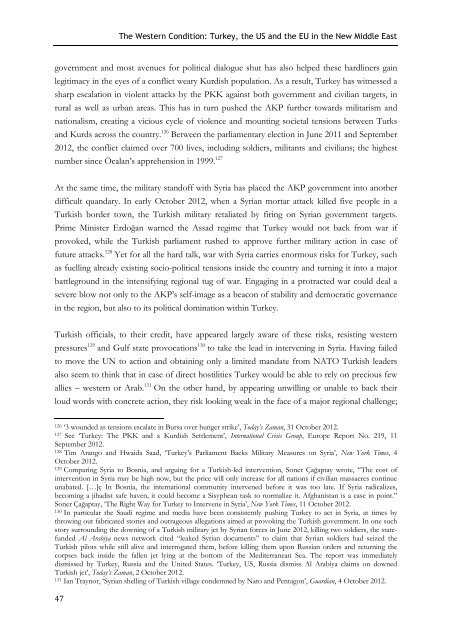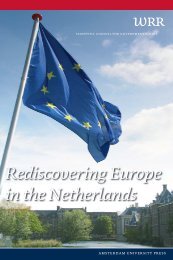The Western Condition - St Antony's College - University of Oxford
The Western Condition - St Antony's College - University of Oxford
The Western Condition - St Antony's College - University of Oxford
Create successful ePaper yourself
Turn your PDF publications into a flip-book with our unique Google optimized e-Paper software.
<strong>The</strong> <strong>Western</strong> <strong>Condition</strong>: Turkey, the US and the EU in the New Middle East<br />
government and most avenues for political dialogue shut has also helped these hardliners gain<br />
legitimacy in the eyes <strong>of</strong> a conflict weary Kurdish population. As a result, Turkey has witnessed a<br />
sharp escalation in violent attacks by the PKK against both government and civilian targets, in<br />
rural as well as urban areas. This has in turn pushed the AKP further towards militarism and<br />
nationalism, creating a vicious cycle <strong>of</strong> violence and mounting societal tensions between Turks<br />
and Kurds across the country. 126 Between the parliamentary election in June 2011 and September<br />
2012, the conflict claimed over 700 lives, including soldiers, militants and civilians; the highest<br />
number since Öcalan’s apprehension in 1999. 127<br />
At the same time, the military stand<strong>of</strong>f with Syria has placed the AKP government into another<br />
difficult quandary. In early October 2012, when a Syrian mortar attack killed five people in a<br />
Turkish border town, the Turkish military retaliated by firing on Syrian government targets.<br />
Prime Minister Erdoğan warned the Assad regime that Turkey would not back from war if<br />
provoked, while the Turkish parliament rushed to approve further military action in case <strong>of</strong><br />
future attacks. 128 Yet for all the hard talk, war with Syria carries enormous risks for Turkey, such<br />
as fuelling already existing socio-political tensions inside the country and turning it into a major<br />
battleground in the intensifying regional tug <strong>of</strong> war. Engaging in a protracted war could deal a<br />
severe blow not only to the AKP’s self-image as a beacon <strong>of</strong> stability and democratic governance<br />
in the region, but also to its political domination within Turkey.<br />
Turkish <strong>of</strong>ficials, to their credit, have appeared largely aware <strong>of</strong> these risks, resisting western<br />
pressures 129 and Gulf state provocations 130 to take the lead in intervening in Syria. Having failed<br />
to move the UN to action and obtaining only a limited mandate from NATO Turkish leaders<br />
also seem to think that in case <strong>of</strong> direct hostilities Turkey would be able to rely on precious few<br />
allies – western or Arab. 131 On the other hand, by appearing unwilling or unable to back their<br />
loud words with concrete action, they risk looking weak in the face <strong>of</strong> a major regional challenge;<br />
126 ‘3 wounded as tensions escalate in Bursa over hunger strike’, Today’s Zaman, 31 October 2012.<br />
127 See ‘Turkey: <strong>The</strong> PKK and a Kurdish Settlement’, International Crisis Group, Europe Report No. 219, 11<br />
September 2012.<br />
128 Tim Arango and Hwaida Saad, ‘Turkey’s Parliament Backs Military Measures on Syria’, New York Times, 4<br />
October 2012.<br />
129 Comparing Syria to Bosnia, and arguing for a Turkish-led intervention, Soner Çağaptay wrote, “<strong>The</strong> cost <strong>of</strong><br />
intervention in Syria may be high now, but the price will only increase for all nations if civilian massacres continue<br />
unabated. […]ç In Bosnia, the international community intervened before it was too late. If Syria radicalizes,<br />
becoming a jihadist safe haven, it could become a Sisyphean task to normalize it. Afghanistan is a case in point.”<br />
Soner Çağaptay, ‘<strong>The</strong> Right Way for Turkey to Intervene in Syria’, New York Times, 11 October 2012.<br />
130 In particular the Saudi regime and media have been consistently pushing Turkey to act in Syria, at times by<br />
throwing out fabricated stories and outrageous allegations aimed at provoking the Turkish government. In one such<br />
story surrounding the downing <strong>of</strong> a Turkish military jet by Syrian forces in June 2012, killing two soldiers, the statefunded<br />
Al Arabiya news network cited “leaked Syrian documents” to claim that Syrian soldiers had seized the<br />
Turkish pilots while still alive and interrogated them, before killing them upon Russian orders and returning the<br />
corpses back inside the fallen jet lying at the bottom <strong>of</strong> the Mediterranean Sea. <strong>The</strong> report was immediately<br />
dismissed by Turkey, Russia and the United <strong>St</strong>ates. ‘Turkey, US, Russia dismiss Al Arabiya claims on downed<br />
Turkish jet’, Today’s Zaman, 2 October 2012.<br />
131 Ian Traynor, ‘Syrian shelling <strong>of</strong> Turkish village condemned by Nato and Pentagon’, Guardian, 4 October 2012.<br />
47

















